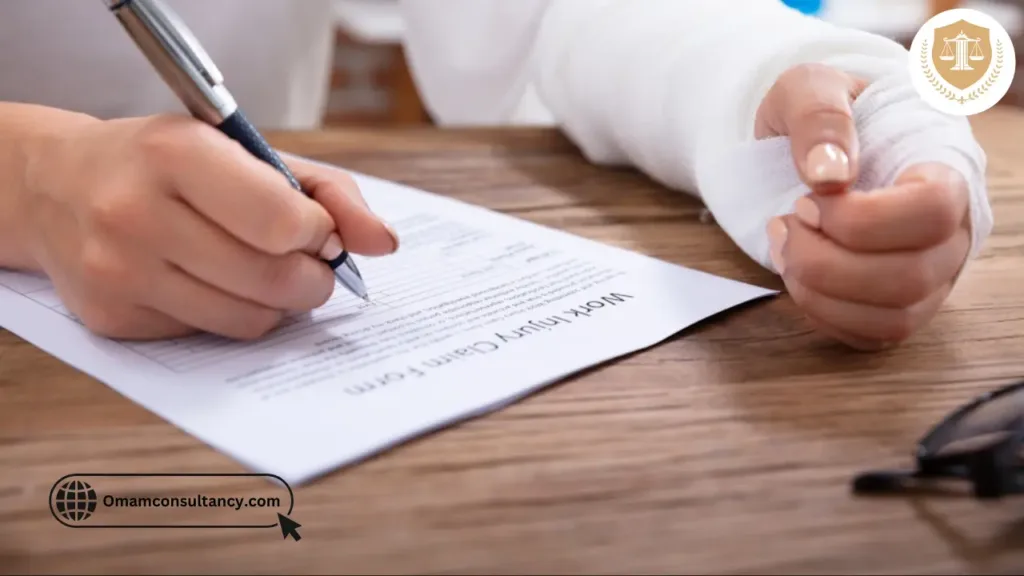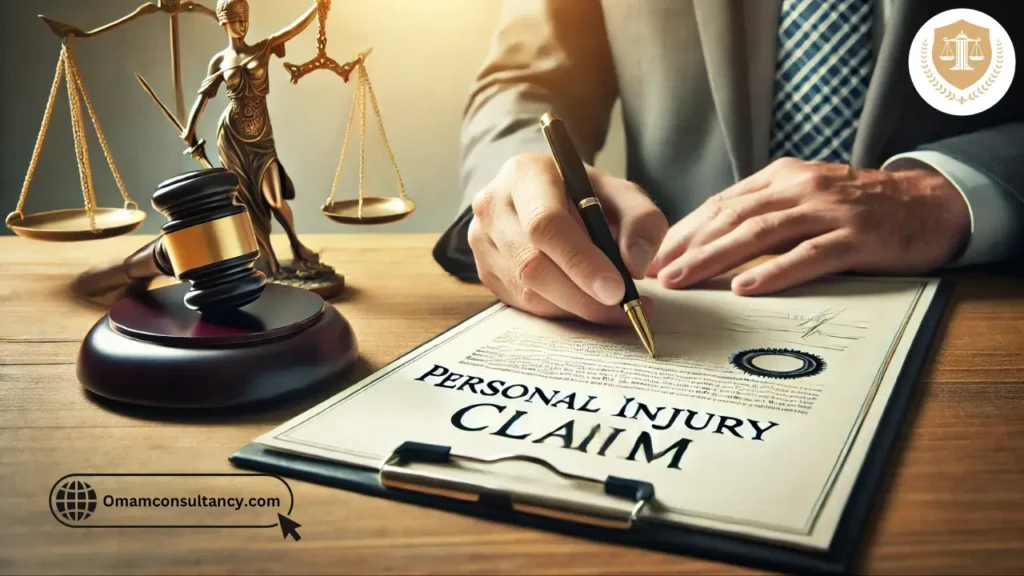Personal injury claims help people seek justice when injured due to someone else’s negligence, whether in an automobile accident, workplace injury, or medical malpractice case. Understanding your rights as an injured party is paramount; many victims hesitate to file claims due to uncertainty about the process or fear of legal costs; yet understanding how personal injury law works could save them financial strain such as medical bills or lost wages. This guide outlines everything from types of claims to legal steps and compensation so you can confidently take action and get justice – let’s go explore!
Quick Answer
A personal injury claim is a legal case to seek compensation for injuries caused by someone else’s negligence.
Common Types of Personal Injury Cases

Personal injury cases involve situations in which someone else’s negligence caused harm. Common examples are car accidents, workplace injuries, slip and falls, and medical malpractice claims; other instances include defective products, dog bites, or emotional distress claims; in extreme circumstances, es families can file wrongful death suits. Each type of personal injury claim has unique legal rules to help victims receive the appropriate compensation based on the type of case they represent – so understanding which one you need help with first is key to receiving just compensation.
Legal Basis for Personal Injury Claims
| Aspect | Details |
|---|
| Definition | A legal case where an injured person seeks compensation due to someone else’s negligence. |
| Common Causes | Car accidents, slip and falls, medical malpractice, workplace injuries, defective products. |
| Types of Damages | Medical expenses, lost wages, pain and suffering, emotional distress, property damage. |
| Time Limit (Statute of Limitations) | Varies by state; typically 1 to 3 years from the accident date. |
| Need for a Lawyer? | Recommended, especially for complex cases or disputes with insurance companies. |
| Settlement vs. Trial | Most claims are settled out of court; trials happen if a fair settlement isn’t reached. |
| Evidence Needed | Medical records, accident reports, witness statements, photos, videos, surveillance footage. |
| Compensation Factors | The severity of injuries, liability, the severity policy limits, strength of evidence, legal evaluation |
| Common Mistakes | Delaying medical treatment, admitting fault, talking to insurers without legal advice, missing deadlines. |
| Legal Fees | Most personal injury lawyers work on a contingency fee basis (pay only if you win). |
Personal injury cases rely on proving negligence; that is, showing that someone’s careless actions caused harm. To win such cases, it is necessary to prove four elements: duty of care, breach of duty, causation, and damages. For instance, drivers must abide by traffic laws; when they run red lights and cause accidents they are at fault. Other cases involve strict liability for defective products or intentional harm such as assault; understanding these legal concepts will strengthen your claim for fair compensation.
Steps to File a Personal Injury Claim
Filing a personal injury claim involves multiple steps. First, seek medical attention and document your injuries; gather evidence such as photographs, witness statements, and medical records; consult a personal injury lawyer to understand your legal options; finally, file with the at-fault party’s insurance if negotiations fail or file suit if needed – acting quickly is key since personal injury claims often have statutes of limitation (SOLs).
Also read: Debt Collection Agency in Dubai A Complete Guide to Recovering Unpaid Debts..
How Can Social Media Affect Your Personal Injury Claim?
Social media can wreak havoc with your personal injury case in more ways than you realize. Insurance companies and opposing lawyers frequently look at posts made on social media as possible evidence against you; for instance, if you claim you have e severe injury but post photos from a vacation or physical activities they could use it against you. Even simple check-ins or status updates could potentially misinterpreted against your claim so it’s wise to limit social media usage until your claim has been settled to protect it.
Factors That Affect Personal Injury Compensation
Numerous factors affect how much compensation you may be eligible to receive in a personal injury claim. One such factor is the severity of injuries–serious ones are likely to lead to higher payouts. Others include medical expenses, lost wages, pain and suffering, and emotional distress compensation payments may also be reduced based on shared fault. Finally, state laws as well as insurance policies also play a part in setting realistic expectations about settlement amounts for your claim. By understanding all these elements you can better set expectations about how your claim might play out.
How Long Does a Personal Injury Claim Take?
Timeframes vary for personal injury settlement. Minor car accidents often settle quickly while complex cases, like medical malpractice suits, may take years. Investigations, treatments, negotiations d co, rt delays all play a part. Insurance companies may further slow the process; hiring an experienced lawyer will speed things up and ensure fair compensation with no unnecessary delays.
Can Pre-Existing Conditions Affect Your Personal Injury Compensation?
Preexisting conditions don’t disqualify you from receiving compensation for injuries sustained in an accident; however, insurance companies might claim your injuries weren’t directly caused by it. Proving how the accident worsened your condition requires providing medical records or statements from physicians as evidence; having legal assistance on your side can ensure you get all the money that’s owed to you.
Do You Need a Lawyer for a Personal Injury Claim?

Attorneys understand legal procedures and can negotiate with insurance companies on your behalf to get you fair compensation. When your case involves severe injuries, disputed liability, or cityor denied claims legal representation becomes essential; many lawyers work on contingency fee bases so hiring one increases your chances of a successful claim.
Common Mistakes to Avoid in Personal Injury Claims
Mistakes that damage personal injury claims can happen for several reasons. Delaying medical care could weaken your case as insurers could argue your injuries aren’t serious enough, gathering too little evidence (like photos and witness statements ), communicating directly with insurers without using legal representation can lower chances of winning, speaking directly with them without representation may result in lower settlement offers and missing the filing deadline (statute of limitations) could even mean giving up entirely on filing any future claim altogether – so avoid these errors to protect your rights!
What Are Non-Economic Damages in a Personal Injury Claim?
As well as medical bills and lost wages, you could also be entitled to non-economic damages such as compensation for pain and suffering, emotional distress, and loss of enjoyment of life and companionship (in certain instances). While non-economic damages don’t have an exact price point attached, courts and insurance adjusters typically consider the severity and long-term effect of injuries when calculating them.
What to Expect in a Personal Injury Settlement

Most personal injury claims end in settlement rather than going to trial, with negotiations between your lawyer and the insurance company beginning shortly after you’ve filed a claim. They’ll consider medical costs, lost wages, pain and suffering damages as well as any other damages. While an insurer may initially offer you less compensation, your lawyer can negotiate for more and if both sides agree on an amount they both feel is fair you receive it immediately or it could go before court to be settled fairly in your favor. A fair settlement ensures your financial recovery.
How Can Surveillance Footage Impact Your Personal Injury Case?
Security cameras, dashcams, and doorbell cameras can play an essential role in supporting your case if an accident is recorded on video. Video evidence can provide important evidence in support of your claim,m; but surveillance footage could also be used against you if it suggests you were partially at fault. As evidence can fade over time it’s critical to collect as much video evidence quickly before it disappears forever; having legal representation assist can ensure all available video evidence supports your cause.
FAQs About Personal Injury Claims
How long do I have to file a personal injury claim?
The time limit, known as the statute of limitations, varies by state. In most cases, you have 1 to 3 years from the date of the injury to file a claim.
How much compensation can I get for a personal injury claim?
The amount depends on medical expenses, lost wages, pain and suffering, and other damages. Serious injuries generally lead to higher payouts.
What if I was partially at fault for the accident?
Many states follow comparative negligence laws, meaning your compensation may be reduced based on your percentage of fault.
Do all personal injury claims go to court?
Most claims are settled out MsMost through negotiations with the insurance company. Only complex cases may require a lawsuit.
How do personal injury lawyers get paid?
Most personal injury lawyers work on a contingency fee basis, meaning they only get paid if you win your case.
Conclusion
Filing a personal injury claim can help you recover medical expenses, lost wages, and other damages after an accident. By understanding the process, avoiding common mistakes, and seeking legal assistance early, your chances of success increase substantially. Every case differs, so acting quickly to gather strong evidence and gathering proof quickly are essential elements for success. If someone’s negligence caused your injuries don’t hesitate to explore your legal options as an effective claim may provide compensation and justice in equal measure.

